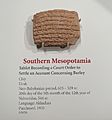Court order facts for kids
A court order is a special instruction given by a judge or a court. It's like an official rule or decision that people involved in a legal case must follow. These orders are usually written down and signed by the judge.
Sometimes, a court order tells someone to do something, like paying money or sharing time with their children. Other times, it tells someone not to do something, like staying away from another person. Court orders can be simple, like setting a date for a meeting, or they can be very detailed and cover many different things.
Contents
What is a Court Order?
A court order is a formal instruction from a judge. It tells people what they must do or not do. Think of it as a clear command from the court. These orders help make sure that legal cases move forward fairly. They also ensure that decisions made by the court are followed.
Most court orders are written down. The judge signs them to make them official. Sometimes, a judge might say an order out loud in court. But even then, it is usually written down later in the court's official records.
Why Are Court Orders Used?
Court orders are very important for a few reasons. They help keep things organized in the legal system. They also make sure that everyone knows what is expected of them. Without these orders, it would be hard to solve disagreements or make sure people follow the law.
For example, if two parents are separating, a court order might decide how they share time with their children. This helps both parents and the children know what to expect. It brings fairness and structure to difficult situations.
Different Kinds of Orders
Court orders can be for many different situations. Some orders are temporary. This means they are only in place for a short time, like while a case is still being decided. These are called interim orders. Other orders are final. This means they are the last decision in a case. These are called final orders.
Here are some common types of court orders you might hear about:
- An order that tells someone to stay away from another person for their safety.
- An order that allows police to search a place for evidence.
- Orders that decide how children will be cared for after parents separate.
- Orders about financial support for children.
- Orders that set dates for court meetings or trials.
These are just a few examples. Judges use court orders to manage many different kinds of legal matters.
Images for kids
See also
 In Spanish: Auto judicial para niños
In Spanish: Auto judicial para niños
 | Sharif Bey |
 | Hale Woodruff |
 | Richmond Barthé |
 | Purvis Young |


